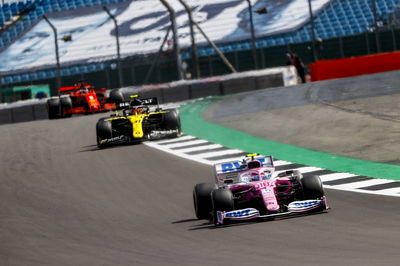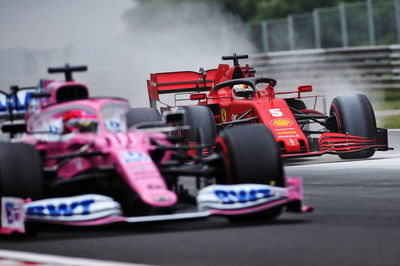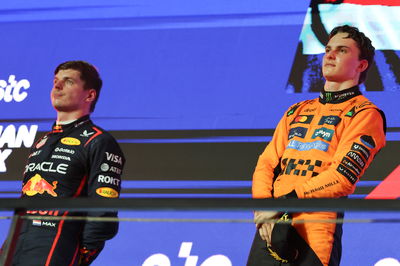Why Mercedes has “zero worries” on Racing Point F1 copying case
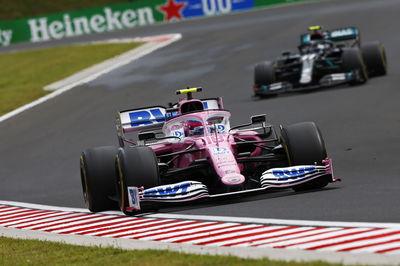
Mercedes Formula 1 boss Toto Wolff says his side has “zero worries” about being involved in any wrongdoing in the controversial Racing Point ‘copycat’ saga.
In a lengthy summary issued by the governing body on Friday morning ahead of this weekend’s 70th Anniversary Grand Prix at Silverstone, stewards concluded that Racing Point had breached F1’s sporting rules relating to the design process of their brake ducts.
Racing Point was docked 15 constructors’ championship points and handed a €400,000 fine after the FIA rejected the Silverstone-based outfit’s arguments that it had designed the brake ducts themselves.
It was revealed that Mercedes had provided Racing Point with CAD data on the brake duct designs of its title-winning W10 from 2019, which was legal at the time before brake ducts moved from non-listed to listed parts.
It was also confirmed that Racing Point had taken delivery of a complete set of Mercedes 2019-spec brake ducts in January this year, after the change in regulations regarding listed parts.
But the FIA considered this transfer of parts was immaterial because it related to 2019 components that had already been made available legally last year.
The FIA concluded that the RP20’s rear brake duct concept was based on what Mercedes had produced, while its current front brake duct design was an evolution of what the team ran last year. It was concluded that the principle designer of the rear brake duct design was Mercedes, meaning Racing Point had broken F1’s design rules.
When addressing the media in the FIA press conference on Friday, Wolff denied the notion that Mercedes had acted improperly.
"We feel a 100% comfortable with our position," said Wolff. "We have read the rules over and over again. The verdict that came out today is extremely complicated, and comes up with an interpretation that is new to all of us. We have provided certain data in 2019, which was totally within the rules.
“The January 6 [delivery of ducts] has no material effect on any of the action, because the whole thing was delivered much earlier. And all the CAD drawings and designs were delivered much earlier. And Racing Point and ourselves are still of the opinion that it's within the regulations.”
Wolff acknowledged he could see some benefits for both parties of the co-operation between the teams, calling it a “win-win situation” that complies with the regulations.
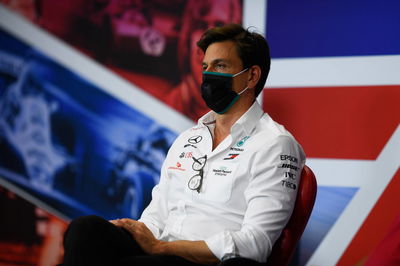
"I see some benefits - I think we have a team that is competing amongst the front running teams now,” he explained.
“This was very much the aim and on the other side, it provides a great source of income for us as a big team, we're able to monetise some of the technologies that otherwise wouldn't be monetised. And I think it's a win-win situation.
"I respect the opinion of the other side, that cars shouldn't look like some other cars. Now, none of the regulations prohibits that. This special situation arose because a non-listed part became a listed part.
"So while it was a non-listed part, things were supplied, but we can have that legal discussion endlessly but at the end, to be honest, there is zero worry on our side.
"And when I say zero, I mean zero, that we were in any breach. Nor do I think that Racing Point was in breach, and I believe that if that would go to the ICA [International Court of Appeal], it would probably be a complex matter, because it's technical, but I doubt there would be any outcome.”
Renault, McLaren and Ferrari have all argued that Racing Point has gone too far with its level of copying, with McLaren and Ferrari both notifying the FIA of their intention to appeal the verdict on Friday evening, while Renault is considering lodging its own appeal.
But speaking to Sky Sports, Wolff hit out what he called “a little revolution” of teams aligning against Racing Point, adding its rivals are simply “upset” they haven’t got the same level of performance.
“We were surprised in a way because there is the strong belief from everybody who is involved, all the lawyers that were part of this that everything was perfectly within the regulations,” Wolff said.
“The tricky thing is that in 2019 those parts were non listed parts and they became listed parts. The non-listed parts were supplied in 2019, full stop, that it what the regulations says. The FIA wanted to come up with a solution that kind of lets everybody live.
“Now Racing Point is pretty upset, they believe they have a strong case and they have lawyers ready to go and appeal. On the other side what I see is that there is a group forming, a little revolution in every sense.
“And they are trying to go after Racing Point because I guess they are upset that they haven’t got the performance that Racing Point have.”
